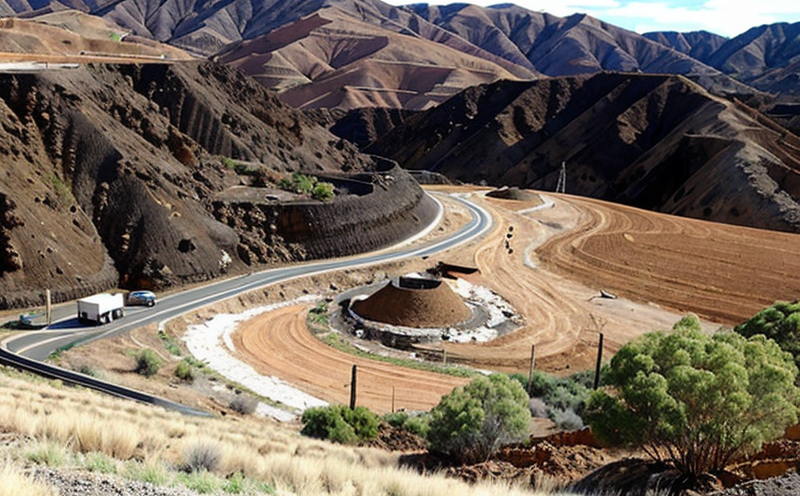DIN 18122 Moisture Content Testing of Rehabilitated Soils
The DIN 18122 standard is pivotal in the field of mine rehabilitation and land restoration, providing a robust framework for assessing moisture content in rehabilitated soils. This testing ensures that the soil conditions meet the necessary criteria for sustainable reclamation processes and environmental compliance.
Understanding the moisture content of rehabilitated soils is critical because it directly influences the stability and success of the reclamation process. Excessive moisture can lead to compaction issues, affecting plant growth and overall land health. Conversely, insufficient moisture might hinder biological activity necessary for successful revegetation. DIN 18122 moisture testing helps strike a balance between these extremes.
The standard specifies the methods to determine the moisture content of soils after reclamation efforts have been completed. It is particularly important in mining sectors where land restoration is essential for ecological recovery and safety. Compliance with this test ensures that the reclaimed lands are ready for use, whether it be for agricultural purposes or public access.
The testing process involves collecting representative soil samples from various depths within the rehabilitated area. The samples are then dried to a constant weight at controlled temperatures (typically 105°C) to measure their moisture content accurately. This step-by-step approach ensures precision and reliability, which is crucial for regulatory compliance.
A key aspect of DIN 18122 testing lies in its standardization. By adhering to this protocol, laboratories can provide consistent results that are comparable across different sites and time periods. This consistency is vital for quality assurance and continuous improvement in land reclamation practices. Moreover, it allows stakeholders to make informed decisions regarding the progression of rehabilitation projects.
Additionally, DIN 18122 moisture content testing supports environmental sustainability by ensuring that reclaimed lands meet specific soil properties required for successful plant establishment and long-term ecological stability. The standard's emphasis on accurate measurement helps prevent potential failures in reclamation efforts, thereby reducing the overall cost of remediation.
Incorporating DIN 18122 into land rehabilitation processes not only ensures compliance with regulatory standards but also enhances the reliability of soil data used for decision-making. This testing contributes significantly to achieving sustainable land use goals by providing a clear picture of the moisture content in rehabilitated soils, thus fostering healthier and more resilient ecosystems.
For quality managers and R&D engineers looking to implement DIN 18122 within their operations, it is essential to understand the practical implications of this standard. By focusing on accurate measurement techniques and consistent testing protocols, they can ensure that reclaimed lands meet all necessary criteria for successful reclamation.
In summary, DIN 18122 moisture content testing plays a crucial role in mine rehabilitation and land restoration processes by providing reliable data that supports sustainable environmental practices. Its rigorous methods and standardized procedures help achieve consistent results, ensuring compliance with regulatory requirements while promoting ecological recovery.
Benefits
- Enhanced Compliance: Ensures that all reclamation efforts adhere to DIN 18122 standards, facilitating compliance with regulatory requirements.
- Improved Soil Quality: By accurately measuring moisture content, this testing helps maintain optimal soil conditions for successful plant growth and ecological restoration.
- Cost Efficiency: Early identification of potential issues through regular moisture content testing can prevent costly remediation efforts down the line.
- Environmental Sustainability: Promotes sustainable land use practices by ensuring that reclaimed lands meet all necessary criteria for successful reclamation and long-term ecological stability.
Eurolab Advantages
At Eurolab, we pride ourselves on offering comprehensive and accurate DIN 18122 moisture content testing services. Our team of experts ensures that every sample is handled with precision and care, adhering strictly to the standard's requirements.
We utilize state-of-the-art equipment and techniques to provide reliable and reproducible results. This commitment to quality allows us to deliver consistent data that can be trusted for decision-making purposes. Our laboratories are equipped with the latest instrumentation and trained personnel who understand the nuances of DIN 18122 testing.
Our flexible approach enables us to adapt our services to meet the specific needs of various clients, whether they are individual landowners or large mining corporations. We provide tailored reports that not only satisfy regulatory requirements but also offer valuable insights into the condition of rehabilitated soils.
Eurolab's expertise in DIN 18122 testing is further enhanced by our comprehensive suite of services, which includes soil analysis, chemical analysis, and environmental monitoring. This holistic approach ensures that clients receive a full picture of their reclamation efforts' overall success.
In addition to technical excellence, Eurolab prioritizes customer satisfaction and timely service delivery. Our team works closely with clients to understand their unique challenges and provide solutions that meet their specific needs. We are committed to fostering long-term relationships built on trust and reliability.





